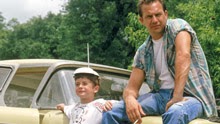Kevin Costner plays a complex villain in Clint Eastwood's film
Film Review by Mike Martinez
UCSD Guardian Hiatus Arts & Entertainment, December 2, 1993
In a perfect world, so to speak, Butch Haynes would never have been abandoned by his father – an event which led to his rebellion against society.
In a perfect world, he would never have received an unusually harsh sentence for his first offense as a juvenile, nor would he have subsequently learned the skills of a criminal while in prison.
Clint Eastwood doesn’t usually make films about perfect worlds, and A Perfect World is no exception. His protagonists are usually world-weary men with a past – iconoclastic loners like Harry Callahan or soaring, flawed gems like Charlie Parker. In this follow-up to the Oscar-winning Unforgiven, director Eastwood tells a story in which some of the good guys have a little bad in them, and the villain is the most complex figure of all.
As portrayed by Kevin Costner, Butch Haynes is part gentleman, part feral beast, with the honed instincts of an outlaw. He breaks out of prison aided by a sadistic fellow inmate, Terry Pugh (Keith Szarabajka). It’s apparent that they don’t like each other – Haynes is calm and controlled, Pugh is violent and brutal.
Szarabajka contributes one of the few discordant moments in the story. When the convicts take eight-year old Philip Perry (T.J. Lowther) hostage, Pugh heaps absurd brutality on the kid, and Haynes eventually kills Pugh. Haynes is acutely sensitive to the mistreatment of children, and is only under such a situation that he is capable of violence. This trait is shown repeatedly, as is the tension between his good and dark sides.
Once on the road, the convict and the boy find a rapport, sharing the common bond of having absent fathers. Haynes treats the boy like a protoge, and Philip is glad to have a father figure. Meanwhile, the police begin tracking the two as they flee across the Texas Panhandle.
The honcho of this manhunt is Texas Ranger Red Garnett (Eastwood). Red is your basic, no-nonsense cop, but Eastwood gives the portrayal a few nuances. It turns out Red was the one who recommended the stiff sentence for the juvenile Haynes. Although Red never shows any overt regret for his actions, Eastwood manages subtle, understated compassion for the fugitive.
As the pursuit continues, many of the lighthearted moments are almost reminiscent of Bonnie and Clyde. Haynes respects his wide-eyed hostage as a full partner, giving him some comical lessons in robbery, firearms and even whore chasing. He creates a fantasy life wherein he plays father and allows Philip to do all the fun things that were previously denied by his strict, Jehovah’s Witness mother.
The genuine chemistry between Costner and Lowther carries the film. The boy is cute and trusting, and his affection for Haynes is totally convincing. Their relationship is not really a father/son bond, but more like that of little Joey and the gunfighter in the classic Shane. Costner is clearly in his prime here, adding sinister shadings to his familiar Bull Durham amiability. Maybe it’s not a perfect world, but it is a world that shows an actor reaching a new place and a director at the top of his game.


